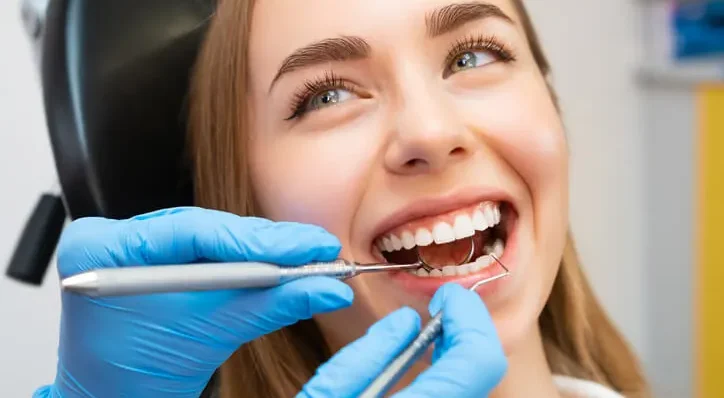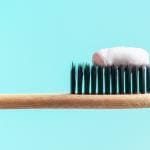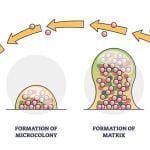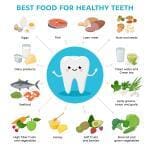It’s a frequent occurrence for myths and misunderstandings to circulate, leading to confusion and potentially steering us toward practices that could harm our dental well-being.
Hence, it’s crucial to carefully navigate through information and discern between fact and fiction in dental care. In this comprehensive piece, our objective is to debunk prevalent dental myths and provide you with the necessary knowledge to safeguard your smile’s health.
Dental myths that we will unveil in this article are:
- Sugar is the sole cause of cavities
- Dental visits are only necessary when you have a problem
- Brushing harder equals cleaner teeth
- Baking soda whitens teeth safely
- Baby teeth aren’t important
- Chewing gum replaces brushing
- Dental health is unrelated to overall health
- Rinse immediately after brushing
- Dental health is determined by genetics
- All toothpaste is equal
- Flossing is unnecessary
- Mouthwash replaces brushing
- Dental X-Rays are harmful
- Bleaching weakens teeth

Sugar is the sole cause of cavities
Reality: Sugar plays a role, but it’s not the sole culprit
One prevalent misconception in dental health is the notion that sugar is solely responsible for cavities. While sugar does contribute to tooth decay, it’s important to recognize that it’s not the only factor at play.
The process of cavity formation is multifaceted. It commences when oral bacteria metabolize sugar, leading to the production of acids that gradually erode tooth enamel. However, factors such as poor oral hygiene, irregular brushing, and neglecting flossing also contribute to cavity development.
To maintain optimal oral health and prevent cavities, it’s crucial to strike a balance in your diet and adhere to a comprehensive oral hygiene routine.
Dental visits are only necessary when you have a problem
Reality: Regular check-ups are essential
Some individuals believe that dental appointments are only necessary during times of pain or emergencies. However, this perspective is misleading and potentially harmful.
The truth is, regular dental check-ups are fundamental for preventive care. During these visits, dentists are adept at identifying early signs of dental issues like gum disease or cavities before they escalate into more serious and costly problems.
Moreover, the professional cleanings administered during these appointments play a pivotal role in removing accumulated tartar and plaque, effectively preventing the onset of severe issues in the future.
Brushing harder equals cleaner teeth
Reality: Gentle brushing is more effective
One of dental myths is that vigorous brushing leads to cleaner teeth. However, this belief can harm your oral health.
Overly forceful brushing can damage both tooth enamel and gums, potentially causing increased sensitivity and gum recession.
The optimal approach to maintaining a healthy smile is using a toothbrush with soft bristles and employing gentle, circular motions. Effective cleaning doesn’t require excessive force but rather a gentle touch and mindful technique.
Baking soda whitens teeth safely
Reality: Proceed with caution
Baking soda is often touted as a natural teeth whitening solution. While it can remove surface stains, it’s important to be cautious. Excessive use of baking soda can erode tooth enamel, posing a risk to overall oral health.
For teeth whitening, it’s best to consult your dentist for safe and tailored options.
Baby teeth aren’t important
Reality: Baby teeth play a crucial role
Some individuals underestimate the importance of baby teeth, assuming they’re disposable since they’ll be replaced by permanent ones.
However, this perspective neglects the essential roles baby teeth play in a child’s development. These early teeth aid in speech development and guide the proper eruption of permanent teeth.
Neglecting oral care during this critical stage can lead to lasting dental issues affecting oral health into adulthood.
Chewing gum replaces brushing
Reality: Gum can supplement, but not substitute brushing
Chewing sugar-free gum has positive effects on oral health by stimulating saliva production. Saliva helps rinse away food particles and neutralize mouth acids, contributing to a healthier oral environment.
However, it’s important to understand that gum chewing shouldn’t replace regular brushing and flossing. These essential practices are crucial for effectively removing plaque and maintaining overall gum and teeth health.
Dental health is unrelated to overall health
Reality: Oral health impacts overall well-being
The condition of your mouth is intricately linked to your overall health. Neglecting oral hygiene can lead to various systemic health problems, including heart disease, diabetes, and respiratory infections.
Activities like brushing, flossing, and attending regular dental check-ups aren’t just about achieving a beautiful smile; they’re also essential for safeguarding your overall health.
Rinse immediately after brushing
Reality: Delay rinsing for better results
After brushing your teeth, it’s common to rinse your mouth with water or mouthwash immediately. However, this practice inadvertently washes away the fluoride present in toothpaste, which helps protect teeth from cavities.
Dentists recommend a different approach: wait at least 30 minutes before rinsing. This delay allows the fluoride to effectively shield your teeth, enhancing your oral health.
Dental health is determined by genetics
Reality: Good oral hygiene can overcome genetic factors
Although genetics can influence susceptibility to certain dental issues, the impact of consistent oral hygiene practices should not be underestimated. Regular brushing, flossing, and dental check-ups can significantly prevent and manage potential dental problems associated with genetic predispositions.
All toothpaste is equal
Reality: Choose toothpaste based on your needs
Not all toothpaste serves the same purpose. There are various types designed for specific oral health needs such as sensitivity relief, tartar control, or whitening.
To select the most suitable toothpaste, consult your dentist. They can recommend the product that best aligns with your specific oral requirements.
Flossing is unnecessary
Reality: Flossing is essential for oral health
While some believe brushing alone is enough for oral hygiene, brushing only targets tooth surfaces, leaving gaps between teeth susceptible to plaque accumulation.
Flossing plays a crucial role in dislodging food particles and plaque from these spaces and along the gumline, serving as a vital preventive measure against gum disease and cavities.

Mouthwash replaces brushing
Reality: Mouthwash complements, doesn’t replace brushing
Although mouthwash can provide a refreshing sensation and effectively eliminate certain mouth bacteria, it should not substitute for essential brushing and flossing practices.
Brushing physically removes plaque from tooth surfaces, while flossing effectively cleans the tight spaces between teeth. While mouthwash can complement your oral care routine, it shouldn’t be relied upon as the sole method for cleaning teeth and gums.
Dental X-Rays are harmful
Reality: Dental X-Rays are safe and necessary
Some individuals worry about radiation exposure from dental X-rays. However, modern dental X-ray machines emit minimal radiation levels, and dentists take precautions to minimize exposure.
Dental X-rays are essential for identifying conditions like cavities, gum disease, and impacted teeth that may not be visible during a routine visual examination.
Bleaching weakens teeth
Reality: Professional teeth whitening is safe
Professional teeth whitening procedures performed by qualified dentists are considered safe. These procedures use approved bleaching agents to effectively remove stains while preserving tooth enamel integrity.
However, caution is advised with DIY or over-the-counter whitening products, as improper use may pose risks.
Conclusion
In conclusion, debunking common dental myths is crucial for maintaining excellent oral health. Armed with accurate information and dedicated to sound dental hygiene practices, you not only improve your chances of achieving a beautiful smile but also reduce the risk of encountering dental problems.
Remember, regular dental check-ups and a balanced diet are fundamental aspects of a robust oral care routine. It’s essential to resist allowing misconceptions to influence your dental care decisions. Prioritize your oral health, and you’ll be on the path to a confident and radiant smile.





